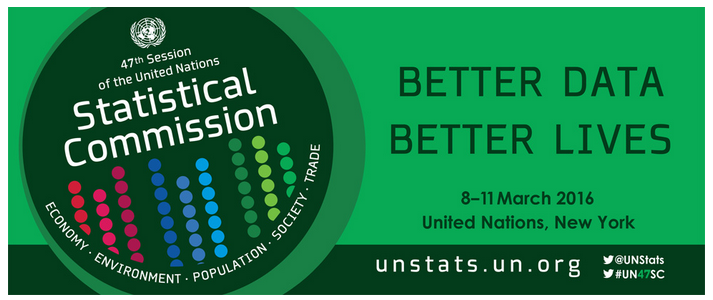The statistics community, Member States, and stakeholders exchanged views and expectations about the UN World Data Forum, during a High-level Forum on Official Statistics.
Among their suggestions, participants called on the Forum to: create guidelines, methodologies and standards for the incorporation of different data sources; help develop a better understanding of how different stakeholders can work together; enable multi-stakeholder groups to work together on developing indicators alongside Member States; drive political commitments to support national statistical systems and capacity building for stakeholders; generate investment plans for capacity building to achieve the Sustainable Development Goals (SDGs) and targets; help young technology companies understand international challenges, find out how they can get involved, and propose solutions; showcase successes of public-private partnerships (PPPs); discuss data disaggregation; and showcase innovations.
 7 March 2016: The statistics community, Member States, and stakeholders exchanged views and expectations about the UN World Data Forum, during a High-level Forum on Official Statistics. Among their suggestions, participants called on the Forum to: create guidelines, methodologies and standards for the incorporation of different data sources; help develop a better understanding of how different stakeholders can work together; enable multi-stakeholder groups to work together on developing indicators alongside Member States; drive political commitments to support national statistical systems and capacity building for stakeholders; generate investment plans for capacity building to achieve the Sustainable Development Goals (SDGs) and targets; help young technology companies understand international challenges, find out how they can get involved, and propose solutions; showcase successes of public-private partnerships (PPPs); discuss data disaggregation; and showcase innovations.
7 March 2016: The statistics community, Member States, and stakeholders exchanged views and expectations about the UN World Data Forum, during a High-level Forum on Official Statistics. Among their suggestions, participants called on the Forum to: create guidelines, methodologies and standards for the incorporation of different data sources; help develop a better understanding of how different stakeholders can work together; enable multi-stakeholder groups to work together on developing indicators alongside Member States; drive political commitments to support national statistical systems and capacity building for stakeholders; generate investment plans for capacity building to achieve the Sustainable Development Goals (SDGs) and targets; help young technology companies understand international challenges, find out how they can get involved, and propose solutions; showcase successes of public-private partnerships (PPPs); discuss data disaggregation; and showcase innovations.
The Forum took place on 7 March 2016, in New York, US, the day before the opening of the 47th session of the UN Statistical Commission (UNSC 47). The High-level Forum was organized as an opportunity for the official statistics community to engage and exchange ideas with representatives from governments, international organizations, academia, civil society and other stakeholders, in preparation for the UN World Data Forum, which will be held later this year under the auspices of the UNSC.
Carmen Barosso, International Planned Parenthood Federation, discussed gaps in the current “abundant” data sources, which include big data, geospatial data, traditional data and citizen-generated data. She said gaps are found in: integrating all these sources in a meaningful way; the coverage of certain groups of people, such as domestic workers, sex workers, or young people; and data on migration. Taner Kodanaz, DigitalGlobe, explained that by using crowd-sourcing and citizen-generated data, his company increases the accuracy of the produced data by 65-90%. He stressed that monitoring, learning and evaluation of data should become “development as usual,” not just a “best practice.”
Judith Randel, Development Initiatives, highlighted that the new sources of data must be complementary to, and not substitute for, quality administrative data. She stressed the need to disaggregate data at the lowest administrative level and to recognize the poor quality of data currently used for public decision making processes, in order to create the incentive for a statistical cultural change. She noted that discussions have focused on the “wrong things”: too much about visualization and too little about data literacy; too much about Big Data and too little about “no data;” and too much about data openness and too little about data use. She also invited Member States and statisticians to think about criteria to prioritize among the thousands of emerging initiatives. Randel highlighted that the “acid test” of the SDGs will be: “what will happen to the poorest 20% globally – will they be better, safer?”
Members of the audience stressed the need to disaggregate data on age cohorts, explaining that there are very big differences when it comes to the aging population between the 50-year old cohort and the 90-year old cohort. They also stressed the need to harmonize the indicators and methodologies adopted by different international organizations.
The organization of a UN World Data Forum was one of the main recommendations of the UN Secretary-General’s Independent Expert and Advisory Group on Data Revolution for Sustainable Development, to serve as a platform for intensifying cooperation on data for sustainable development with multiple stakeholders, including information technology professional, geospatial information managers, data scientists, data users, and members from civil society. [Event Webpage] [IISD RS Sources]